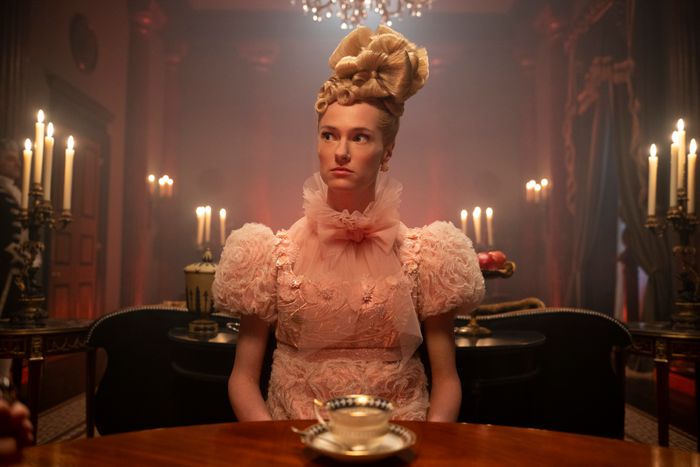
Bridgerton often feels divided between two impulses. There’s the sexy stuff appealing directly to the romance-genre aficionados who grew up on Mr. Darcy’s hand flex and want to know what happened behind closed doors — the secret make-outs, the chaise-longue trysts, Benedict’s bisexual ménage à trois that seems to last a week. It’s risqué. It’s sensual. It’s pleasant to watch two hot people press their faces together. All of that must be balanced, though, by Bridgerton’s guiding philosophy of acceptance and forgiveness. This show isn’t just Regency smut; it’s a fantasy in which people, after a long sequence of miscommunication, finally find common ground and put aside their past grievances. Bridgerton has spent three seasons expanding its big tent (or, say, its big balloon) to include all kinds of people who have previously done wrong and give them a second chance at acceptance and even love. So why couldn’t it do the same for Jessica Madsen’s Cressida Cowper?
For all of Bridgerton’s unevenly executed racial diversity, there’s something a little easy about making Cressida — the tall, thin, blonde woman with the aggressive fashion sense — one of its only unambiguous villains. The series treats her like Heather Chandler or Regina George, a smirking bully whose cruelty toward Penelope is practically reflexive but whose intelligence can’t compete with our favorite scribe. What she lacks in smarts she makes up for in brazenness, lying to Queen Charlotte and trying to blackmail Penelope and Colin. Bridgerton treats all of these actions as signs of Cressida being so inexcusably self-centered and craven that she deserves to be shipped away to her aunt’s cold, lonely home in the country at the end of the season. It’s the rare unhappy ending in a world that otherwise traffics in idyllic reverie, and it punctures the season’s otherwise thoughtful presentation of Cressida as an inverse of Penelope: both women whose parents limited their prospects, whose family’s money problems dictated their futures, and whose desperate actions were inspired by a desire for independence in a world where a woman’s worth is still tied to her husband. Bridgerton denying Cressida the same empathy and opportunity for redemption it gives to Penelope, not to mention nearly everyone else in its cast, is a surprising failure of its own fanciful premise.
In the series’ third season, beloved underdog Penelope Featherington (Nicola Coughlan); her best friend, Eloise Bridgerton (Claudia Jessie); and Penelope’s love interest and Eloise’s brother, Colin (Luke Newton), are divided by the reveal that Penelope is actually the writer Lady Whistledown, whose gossip columns are the talk of the ton whenever a new one comes out. None of them handles Penelope’s secret particularly well. Penelope lies about her nom de plume and hides it from Colin. Eloise shoves Penelope away, breaking up their friendship and taking up with Penelope’s rival, Cressida. When Colin finds out about Penelope’s writing, he’s standoffish and jealous. All three are self-involved — and all three get happy endings at the end of the season, unlike Cressida, who sees in Queen Charlotte’s (Golda Rosheuvel) offer of a reward for information on Lady Whistledown a chance to break away from the high society that has always judged her and the family that has long considered her a commodity to be sold to the highest bidder.
When Cressida pretends to be Lady Whistledown to collect the queen’s reward so she can start a new life, she inadvertently pushes Penelope to realize she should unveil herself. After Cressida publishes an edition of Lady Whistledown’s pamphlet (with her bitter mother doing most of the writing, because Bridgerton also has to make Cressida an idiot who can’t write one sentence on her own), whether Penelope can have it all becomes the focus of the season’s final two episodes. Can she have blissful, raucous sex with her new husband, Colin, and be accepted by the Bridgertons, whom she has envied for years, and make peace with the Featheringtons, and gain Queen Charlotte’s approval — and put Cressida in her place? The show expects us to root for all of this, for Penelope to step away from wallflower status and take center stage, and literally gives us that scenario in the finale when Penelope makes a passionate appeal for reconciliation to all the people she has written about.
But what about Cressida? Can she have, like, anything? Yes, she’s been mean to Penelope in the past because she grew up in an environment where such behavior was encouraged. (“In this world, it is every person for themselves, especially amongst women,” her mother tells her.) Many other characters on this show have been rude to the youngest Featherington, but nearly all end up with some sort of happiness, like Penelope’s sisters Prudence (Bessie Carter) and Philippa (Harriet Cains), contentedly married parents by the end of the season, and even Colin, who said to his friends, “Are you mad? I would never dream of courting Penelope Featherington,” and then does just that. All of these people who have wronged Penelope and wronged the Bridgertons are allowed to start again in the ton, except for Cressida, whose crimes of character are not much different from Penelope’s.
If Penelope still deserves love, happiness, and personal fulfillment despite her years of misleading and spreading gossip about her family and friends, why doesn’t Cressida deserve at least a fraction of the same? The show presents them as two-sides-of-the-same-coin characters but can’t reconcile a happy ending that works for both of them. In the beginning of the season (Cressida’s third try at snagging a husband, just like Penelope), Cressida too decides to marry for practicality because of her parents’ pressure (like Penelope). While going after the eligible Lord Debling (like Penelope), Cressida lies to him about sharing his interests (like Penelope). Her attempt at charming him fails, putting her on further bad terms with her demanding parents and leading to her admission that she’s living “the tragedy of a spinster whose father is now promising to marry her to one of his aged friends” — a fate that, were it to befall anyone else, would secure our sympathy. Every attempt Cressida makes at genuine connection is rejected, including her friendship with Eloise, who befriended her only because she and Penelope were on the outs and who drops her to continue the ruse that Penelope is not Lady Whistledown. And her standing up for herself to Colin when he tries to pressure her into abandoning her blackmail threat against Penelope is presented as reprehensible rather than acknowledging the strength of character it takes for any woman on this show to push back against a man telling her what to do.
That different set of expectations, and more drastic punishment, for Cressida punctures Bridgerton’s redemptive fantasy. If Penelope’s lies and insults as Lady Whistledown are justifiable because she felt lonely, unwanted, and rejected by the ton, why aren’t those of Cressida, who also felt lonely, unwanted, and rejected by the ton? When Colin tries to rationalize Penelope’s stealthiness to Cressida, he asks her to “imagine being so ignored you feel invisible” and valorizes his fiancée by saying that “even Penelope can find grace for you.” This statement ultimately comes from a place of ignorance from Colin, who can’t imagine the pressure Cressida is under as a daughter whose only value is found in her marriage prospects, and from a position of power, both his as a Bridgerton and Penelope’s as Lady Whistledown, when Cressida, fated to exile by her parents, has none. Cressida’s last onscreen moment shows her being sent to the countryside while Penelope gets to ascend, her Lady Whistledown–style narration wishing Cressida “only the best” with clear condescension.
If any other character were ostracized like this, Bridgerton would be deliberate in pointing out how they were disserved by the social mores of this time. And perhaps that’s still on the horizon: Penelope’s speech at her sisters’ ball suggests she sees a kinship between herself and Cressida — “No one has ever taken any part of me seriously. I only realize now how common that feeling must be, to be a young lady to whom no one listens” — and signals a possible comeback story in the series’ future. If the door is open in season four for Eloise and Francesca to return after their time in Scotland and Kate and Anthony after their trip to India, why not extend that same opportunity to Cressida for a story line that course-corrects the series’ wonky treatment of her? Provide her with a triumphant return to the ton in a new series of attention-seeking gowns and with a new sense of how unfairly she was treated by her peers; have her be so self-assured that it encourages Penelope to think about the unequal power dynamics of their enmity and forces Eloise to realize she wronged Cressida by snubbing her to protect Penelope. Bridgerton used Cressida as a stepping stone for Penelope’s finding-herself arc, but Cressida isn’t a foil; she’s a mirror. Now that Penelope has all the protections of wealth and status, it’s time for Cressida’s own glow-up.
More From This Series
- Pride 2024’s Most Femininomenal Moments
- Sounds Like Netflix Didn’t Actually Have a Polin Allergy
- Vulture Asks: What Do You Want to See in Bridgerton Season 4?





